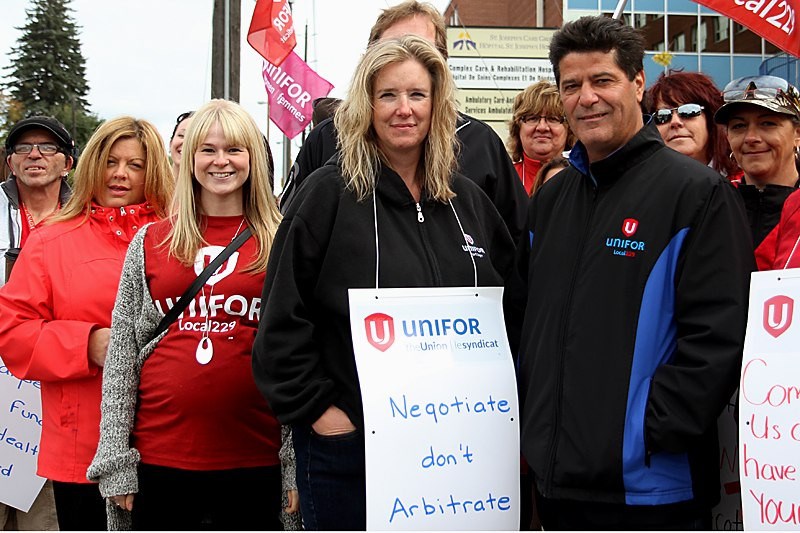THUNDER BAY -- More than 2,500 workers at regional health-care facilities will be working without a contract after next week.
At a Monday afternoon rally at St. Joseph’s Hospital, Unifor Local 229 president Kari Jefford was adamant the union will put up a fight after their contract expires on Oct. 10.
“We would like to see them come to the table and negotiate a wage increase, a compensation package or even to maintain what we have. There are huge concessions on the table,” Jefford said.
“The hospitals are in a bad spot right now. They aren’t getting adequate funding. Funding for hospitals and long-term care and those services have been frozen for two years.”
The union is trying to fight on two fronts. In addition to pushing the local organizations, they also recognize that government funding at both the federal and provincial levels needs to increase to allow the facilities to maintain their current standards.
But Jefford said that’s no reason for workers to be urged to accept concessions while not having received a wage increase in two years while seeing management receive raises and bonuses.
While she would not comment on the nature of the concessions, Jefford said other negotiations across the province have sought to change drug plans, health benefits and sick time.
The union represents workers at more than 50 sites across Northwestern Ontario including St. Joseph’s Hospital in Thunder Bay, Wilson Memorial Hospital in Marathon, Nipigon District Hospital was well as others in Atikokan, Manitouwadge and Geraldton.
Making matters worse, Jefford said there have been cuts in various areas of operating the hospitals, as well as having full-time positons replaced with part-time staff.
Reductions to what seem like secondary positions in the hospitals affect the entire system.
“When you’re understaffed in housekeeping that means infection control isn’t a number one concern or you have c. difficile and all these other superbugs that are killing our residents and patients in all of our hospitals,” she said.
As an essential service, the union members are prohibited from actually striking and walking off the job but there are still other ways to make a point.
Nevertheless, strike mandate votes have been held across the region and consistently at least 95 per cent of the workforce voted in favour of action.
Unifor national president Jerry Dias travelled to Thunder Bay for the rally, hoping that spreading the message to the general public will put pressure on the involved parties.
“We’re going to educate the population,” he said. “We’re going to talk about the issues and we can certainly do some stuff. Taking care of the residents and patients is primary and will never be impacted but people need to start challenging the management team and the government.”
Getting to the point where strike mandate votes are conducted is unprecedented locally.
“It’s never happened before but we need to send a very clear message to the employer and government that we need to fight for Medicare in this country and we’ll do what we need to do to secure that for all of us,” Jefford said.
“That doesn’t mean the folks that aren’t delivering the services in the hospital the other folks can be out on the picket line raising awareness and mobilizing our community.”
